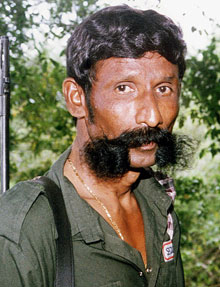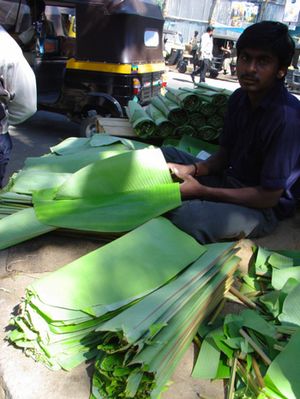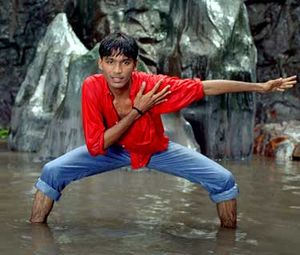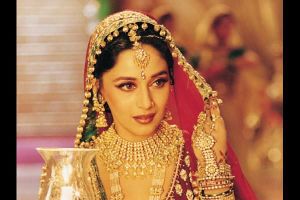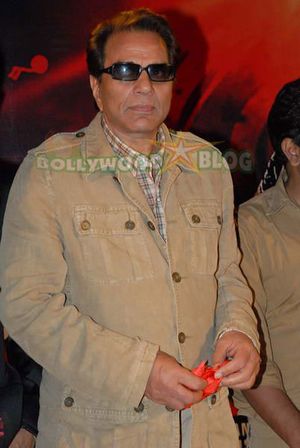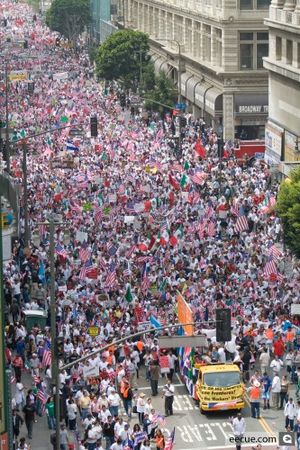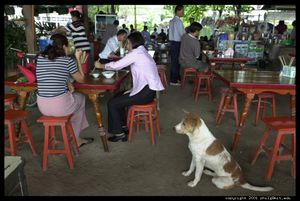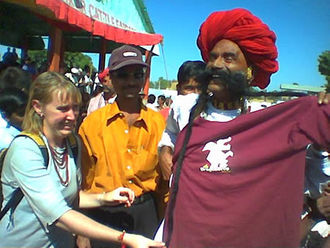Parthasarthy Fevaraju
Parthasarthy Fevaraju (1931 - ) is a notable Indian film actor and director. Fevaraju, referred to commonly by his nickname "Party Fevar", enjoys a loyal fan-following across the globe, especially in India, Pakistan, The Vatican, and Easter Island. He is best known for his portrayal of heroic software engineers, heroic doctors, and heroic doctors with a working knowledge of software engineering.
Early Life[edit | edit source]
Parthasarthy Fevaraju was born on April 1, 1931 to Somasundaram and Laxmi Fevaraju. He spent his first years of life in the village of Yaddigiri Gutta, Andhra Pradesh, where his father worked as a fruit salesman, and his mother as a homemaker. Fevraju's childhood was marked by highly unusual treatment by his parents, who apparently did not conform to any society's interpretation of normal. Until the age of eight, Fevaraju was provided only with large banana leaves for clothing, even though his family could easily afford (contrary to popular belief) cloth-based apparel. This situation was the impetus for Fevaraju developing his acting skills, as he had to come up with a variety of witty stories to justify his wearing banana leaves to school each day. This experience was, as Fevaraju has frequently described in interviews, a "living hell, yaar."
Parthasarthy's childhood was not entirely unhappy. As a young boy, Fevaraju enjoyed playing soccer among the various packs of wild dogs that roamed his village. This unorthodox entertainment had a significant impact on Fevaraju, who has been known to travel with an entourage of wild, soccer-playing dogs wherever he goes, including movie sets.
At the age of twelve, Parthasarthy dropped out of school in order to assist his father with supporting the family. On his first day of work, Fevaraju's father handed him a straw basket filled with guavas, and set him on his way. That evening, Fevaraju returned home carrying only an empty basket, and announced to his parents that all of his fruit had been stolen by a gang of rowdy schoolchildren, and he had not earned a single anna. While upset, Fevaraju's parents were sympathetic to their son's misfortune. Unfortunately, this exact same scenario played itself out everyday for two years- Parthasarthy returned home each day without any fruits and without any money. Eventually, Fevaraju's father discovered that his son had been secretly feeding the guavas to the wild dogs of the surrounding villages. Parthasarthy's excuse for his behavior, foreshadowing some of his most beloved one-liners as a screen actor, was that "I used the guavas as halftime snacks for the dogs during our football matches. Sorry, I couldn't afford Dunkaroos and Juicy Juice boxes."
Shunned by his family, Parthasarthy Fevaraju headed for the city of Hyderabad to begin the next phase of his life.
Life in Hyderabad[edit | edit source]
Making the transition from rural life to the hustle and bustle of Hyderabad was not easy for young Fevaraju. Without his family and friends, Fevaraju's life seemed to have lost its direction. As he mentions in his autobiography, I Was Born In A Village, Yaar, "...even the wild dogs in Hyderabad seemed foreign to me. They only played field hockey, and that too only on weekends."
After days of searching, Fevaraju finally found a job which involved sitting on top of overloaded cargo lorries, not really doing anything. The job did not pay very well, but it was easy work, and afforded Fevaraju a sense of independence that he had never enjoyed while in Yaddigiri Gutta village. After a few years, his job became quite monotonous, and Fevaraju began to feel that he was not accomplishing very much in life. Dejected and dissatisfied, Fevaraju marched into his boss's office and announced that he would quit his job. The following is an excerpt from Fevaraju's old boss's autobiography, Once Upon A Time, I Knew Fevaraju, transcribing the scene:
Fevaraju: "I quit."
Boss: "I'm sorry, do I know you?"
Fevaraju: "Yeah, I work for you. I sit on top of your lorries."
Boss: "In the driver's cabin?"
Fevaraju: "No, like on top of the cargo. No seat belts."
Boss: "So I pay you a salary to sit on top of my lorries?"
Fevaraju: "Apparently."
Boss: "Somebody call the cops."
Fevaraju: (Escapes out the back door)
And with this, Fevaraju left his lorry-sitting duties, and began another phase of soul-searching. He would take long walks along the picturesque Hussain Sagar (lake) in Hyderabad, wondering what he would make of himself. During this time, Fevaraju began growing his now-infamous moustache. Legend has it that Parthasarthy's moustache grew to its full length of 3 ft. in the span of two weeks, a testament to the magical aura surrounding Fevaraju, as well as the ridiculousness of moustache legends.
Discovered[edit | edit source]
On October 17, 1951, Fevaraju's life, and indeed the history of mankind, would be altered forever. As he strolled along Hussain Sagar, Fevaraju spotted a young girl flailing her arms in the middle of the lake, apparently drowning. Acting on instinct, he dove into the lake, and using his disgustingly long moustache as a floatation device, brought the girl safely to shore. As luck would have it, famed movie director Sanjay Spielbergswamy observed the entire episode while eating ice cream along Hussain Sagar. He immediately approached Fevaraju, and reportedly mentioned to him that "such heroism could translate into magic on the cinema screen. I to you am promising only, you will become the next great Indian mega-star."
One week later, Fevaraju began filming his first action film, Papdi Chaat, with Spielbergswamy in the director's chair.
Early Films[edit | edit source]
The following is a brief list of Fevaraju's early films, including the notable feats his characters achieved in each film.
| Year | Film | Heroic Achievement |
|---|---|---|
| 1951 | Papdi Chaat | Captures a bandit using his moustache as a lassoo. |
| 1952 | Gutkha | Eliminates corruption across India. Then wakes up from his dream. |
| 1955 | Gutkha 2 | Falls in love with his sister-in-law. Oops. |
| 1956 | Gutkha 3 | Builds many free hospitals in India. And one in Sri Lanka. |
| 1957 | Main Kabhi Kabhi Mujhse Boltha Hun (I Sometimes Talk To Myself) | Revives a championship racehorse from the dead using only the power of his singing voice. |
| 1960 | Main Thak Gaya Hun (I Have Become Tired) | Manages to convince his parents to allow him to have a love marriage instead of an arranged marriage. |
| 1961 | I Love U++ | He's a software programmer who manages to get a date with a girl. |
| 1961 | Chak De Junglee Kutte | Teaches a group of troubled young soccer players to play together, work as a team, and believe in themselves. There's one catch: the players are all wild dogs. |
| 1963 | Aapka Faisla Reconsider Kijie (Please Reconsider Your Decision) | Disowned by his family. |
Rise To Stardom[edit | edit source]
By 1963, Fevaraju had become a prominent actor in Hindi cinema. Aapka Faisla Reconsider Kijie was a decent hit at the box office, and proved to the moviegoing public that Fevaraju could convincingly play in a lead role (it took him 15 films to actually convince them of this). Parthasarthy was relatively well-known, but did not command the aura of a true mega-star. Although most of his films were shot at movie studios in the Bombay metropolitan area, Fevaraju maintained his home in Hyderabad, choosing to lead a life outside of the limelight and culture of excess in Bollywood. In 1966, however, this would all change with the arrival of a brilliant young director in Bollywood: Rash.
Rash Chopra was an up-and-coming director at the time. His unusual first name was borne of his tendency to break out into a hideous rash anytime he saw a film without several song-and-dance sequences. By 1966, Rash had proven his immense directing talent by simply being the son of eminent film director Hives Chopra. For his first attempt at film directing, Rash wanted to work with an actor who was able to play multi-faceted roles and who was not afraid to challenge the Bollywood norm. This actor was, of course, Dharmendra. Since Dharmendra did not want to act in his films, Rash approached Fevaraju.
The creative chemistry between Fevaraju and Rash was apparent almost immediately after their first meeting. After an intense 3-minute brainstorming session, the duo developed the storyline of their first smash hit, Restraining Order. The film told the story of an ambitious autorikshaw driver (played by Fevaraju) who is constantly attempting to woo a beautiful woman (played by Madhubala) through song and dance. Eventually, Madhubala is forced to have a restraining order issued on Fevaraju (both in the film, and in real life). Restraining Order opened to house-full audiences and rave reviews, and the film became an instant cultural phenomenon. Soon people across India were humming to the film's songs, including "Happy Walentine's Day, My Lowe", "I Am Not Your Walentine, I Don't Even Know You", "Stop Approaching Me In The Street", and "A Restraining Order Can't Restrain My Love". Fevaraju's famous one-liner in Restraining Order, "Your hair flows like the loose skin of a cow's neck, my lowe," became the top catch-phrase of 1968.
Fevaraju experienced a meteoric rise to mega-stardom, and for the next two decades, every one of his films garnered blockbuster status.
Video of one of Fevaraju's most famous dance sequences
Attempt At Hollywood[edit | edit source]
By the late 1990s, Parthasarthy Fevaraju's star had faded. The man who had once dominated Hindi cinema during the 1970s and 1980s was now finding it difficult to land roles. As a senior citizen in his late 60s, Fevaraju was starting to get rejected at auditions for his traditional "bread-and-butter" characters. It wasn't long before actresses began refusing to co-star in films with Fevaraju. As one prominent actress stated, "Eww, gross, yaar. I can't kiss him in the film, he looks like my dadiji. I think he even went to high school with my dadiji. Gross, yaar." Fevaraju responded to this criticism by saying, "Uh, hello, I never went to high school, so take that! Wait, I don't think that makes me look any better..."
Fevaraju finally came to terms with his age when his film Primary School flopped at the box office; in the movie, Fevaraju played the role of a 9 year-old boy discussing the trials and tribulations of second grade. Feveraju's movie career was flailing, and his financial situation was not looking promising, either. In 1998, Fevaraju was forced to declare bankruptcy, as he realized that he had used all of his remaining life savings to purchase soccer balls for the Humane Society of India. Amidst these crises in his film career and personal finances, Parthasarthy looked to foreign shores for a ray of hope. He flew to Los Angeles and hired an agent, who began shopping Fevaraju around the various Hollywood movie studios.
In a stroke of good fortune, Fevaraju's agent managed to land him a part in the movie The Sixth Sense, directed by M. Night Shyamalan. Shooting for the film began in late 1998, with Fevaraju playing the role of Cole, the 9-year old boy who could see dead people. The Sixth Sense was completed within a few months, and movie was screened for test audiences prior to being released in theaters. Unfortunately, these test audiences disliked Fevaraju's performance so much that they frequently began riots in the streets outside the screening facility. As a result of this, Buena Vista Studios decided to re-make the entire film with a real 9-year old actor (Haley Joel Osment), and fired Parthasarthy. The film reel which contained the Fevaraju version of The Sixth Sense was subsequently burned by M. Night Shyamalan. Ironically, the original cinematographer for the film claimed, in a rare interview, that the Fevaraju version was in fact "scarier than the version we actually released to theaters", simply due to the fact that "...having a 68-year old man acting in a child's role freaked me out. Seriously."
With the failure of his Sixth Sense project, Fevaraju prompty returned to India, and has not since been approached for a Hollywood film production.
Hotel Saravanaa Bhavan Scandal[edit | edit source]
On October 28, 2007, Parthasarthy Fevaraju became embroiled in one of the most unusual celebrity scandals in recent memory. While dining at the popular 'Hotel Saravanaa Bhavan' in Kanchipuram, Parthasarthy brought a pack of wild dogs into the restaurant. To make matters worse, Fevaraju ordered Madras coffees for all of the dogs, and the animals soon became extremely hyper. Needless to say, the management of Hotel Saravanaa Bhavan was not happy about this situation. Fevaraju was soon arrested, and his spokesperson released the following official statement.
"Fevaraju innocently invited several of his friends to Hotel Saravanaa Bhavan to dine with him this afternoon. He did not know that they were dogs until they arrived at the restaurant, and at that point it would have been rude of him to turn them away. Additionally, I think that discrimination against wild dogs is against Part III of the Indian Constitution, and...oh, sh***, whatever. Listen, y'all, my boss is a psycho. I can't keep making these stories up. The dude brought wild dogs into a restaurant. Are you friggin kidding me?"
Fevaraju is currently out of jail on bail, and is putting together a high-profile legal defense team to fight his case in court. Fevaraju has been kind enough to announce that any lawyer that will work on his legal team will voluntarily do the case pro-bono.
Endorsement Deals[edit | edit source]
With his acting career having come to an unceremonious close, Fevaraju has begun signing various brand endorsement deals to provide for himself financially. However, being the Renaissance Man that he is, Fevaraju's endorsement contracts are not typical by any means. The actor has been approached by several large corporations, including Adidas and Hanes, that are willing to pay Fevaraju sizeable amounts as long as he promises to never use their products again. As one Hanes executive states, "It's too risky for our brand image to have people even imagining Fevaraju wearing Hanes undergarments. If you can't understand this, you need to see the original version of The Sixth Sense. Disturbing."
The National Dairy Farmers Association of India reportedly paid Parthasarthy Rs. 12 crores, and in return received Fevaraju's promise to never be seen drinking milk ever again. Such new-age endorsement deals, popularized by Fevaraju, are now benefitting other celebrities, including Mark Fuhrman (racist cop extraordinaire) and A.J. McLean of Backstreet Boys fame.
Fevaraju the Television Producer[edit | edit source]
Parthasarthy's most recent media venture (read: failure) was the infamous 2007 reality show Please Help Me!. The program was the brainchild of Fevaraju and Mark Burnett, producer of the hit series Survivor. The premise of Please Help Me! was simple, and was an easy sell to television executives in India- contestants would compete to provide personal financial advice to Parthasarthy Fevaraju, free of charge. The winner of the show would be the contestant who provided the most seamless gameplan for Fevaraju avoiding personal bankruptcy.
The major controversy surrounding Please Help Me! involved the Grand Prize. Maintained as a secret until the very end of the first episode, Fevaraju revealed on national television that the winning contestant would receive a 20% discount coupon for a one-way flight to Baghdad, Iraq. As a result, the entire cast and crew of Please Help Me! filed a joint lawsuit against Fevaraju for inflicting serious emotional distress on them.

